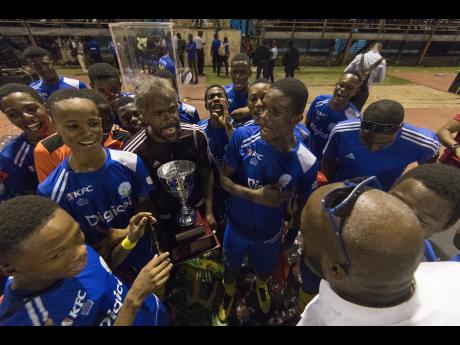Laurie Foster | Much for ISSA to consider
Another Jamaican school-boy football season has come to its end. The person or persons who wrote the script should be on a high, given that so many boxes, which seem to promote progress, have been ticked. It was a season for the palates which delight in history. Cornwall College pouched the 5-year-old Champions Cup trophy for all-island knockout encounters, a historic first for a rural school. Competitions like the Manning Cup, which Kingston College took after 32 years in the wilderness, and the daCosta Cup and Olivier Shield, both going to Clarendon College, have been around for decades.
The North Street school, coached by Ludlow Bernard, was wondering if it would ever happen, while the Lenworth Hyde Clarendonians were adamant that their success should be dedicated to the recently departed Jamaican icon, coach Winston Chung-Fah who, with Hyde as the talisman, crowned them the bigwigs in 1977-78.
However, regardless of the history, changes are always welcome, provided they redound to a healthier state in the format and its execution.
As a look is taken on the stewardship of the governing body for all three early vintage competitions, the Inter-Secondary Schools Sports Association (ISSA), Foster's Fairplay is attracted to two innovations that, if sustained, will give a new look and feel for what is to come.
Unfortunate alterations
One of these, which actually came into being for 2018, is the amendment in the regulations under which the Walker and Ben Francis trophies are contested. With so much having already been said, a significant amount in rejection, it is sufficient to refer to this particular alteration as unfortunate. Both conceptualisers of these trophies have passed, but it leaves a question. Could it have been in their thoughts to have teams who fall short of the excellence, which they portrayed in their own careers, vie against one another and at the end of the day be called champions.
This is the label now given to Charlemont and Hydel, the rural and urban winners, respectively. Messrs Walker and Francis were both captains of the education industry, and it is difficult to conceive that they would want to recognise and reward teams which fall in the category that the two last-named have. What is further troubling is that teams which advanced to the later stages of the competition end up empty-handed, while the St Catherine duo can look at the trophies, which now adorn their cabinets.
They are to be congratulated, as they played the games and triumphed with the format which was open to them. It cannot be their fault why such a lopsided decision was made. Meanwhile, the teams that advanced from the opening round in which the lucky duo was ousted have just got to go back to the training ground and hope that fortune will favour them next time around. In fairness to ISSA, they have voiced an intention to take a second look at the situation, which tends to confirm that the original ruling had some faults.
On the plus side from ISSA are the new regulations governing the recruiting of athletes from one school under their canopy to another. To put it in its simplest form, no receiving school will be able to register more than three athletes for competition in 2019 and beyond. Those who qualify through the sixth form route are not affected. Foster's Fairplay welcomes this amendment. It will compel the schools which are in the business of recruiting to be more selective in their choices as to who to bring in.
The bottom line to this activity is clearly to enhance the status of the team and place it in a more advantageous position to challenge for Champs honours. There have been accusations in the past that schools will import athletes who are not needed immediately, as they seek to deny a close rival the chance of signing those athletes. This also denies the athlete the opportunity to make his or her own mark, even if it is inferior to the so-called 'better recruits.' There is such a phenomenon as 'late bloomers.'
ISSA should be lauded for this astute move which should, in addition, lead to a wider spread of talent on show at the high-school level.
Is that not what is required?
Feedback: e-mail: lauriefoster2012@gmail.com

